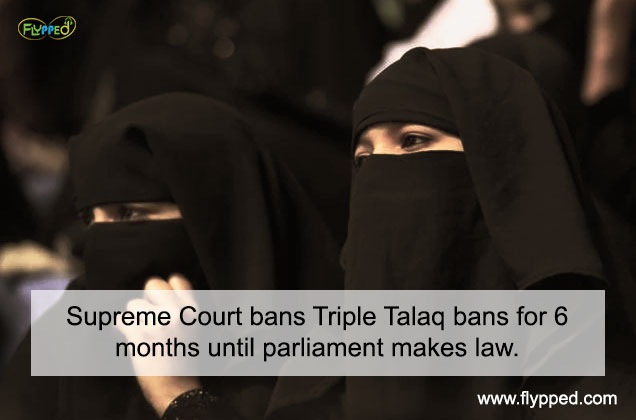Justice prevails upon as the landmark judgment to change the lives of about nine crore Muslim women has been rolled out by Hon’ble Supreme Court of India declaring the ‘Triple Talaq’ as unconstitutional. A 5-judge Supreme Court bench headed by Justice Khehar has barred the controversial Triple Talaq practice, asking the Centre to bring legislation. The apex court put a six-month stay on the practice, directing Parliament to enact a law within the given time period.
The apex court had reserved its verdict in the May 18 special hearing during summer vacations and they have already calrified that the court will not be looking into the issue of Polygamy and will only examine as to whether the Triple Talaq is a part of the Enforceable fundamental right to profess religion by the Muslims.
The decision came out as a consequence of the Writ petition filed by the Muslim Women against the practice of Triple Talaq in whcih the husband could convey Talaq word thrice verbally, even by phone or by text message to get divorce from their wives. The Bench of the judges consisted of five judges from different religious communities including Sikh, Christian, Parsi, Hindu and Muslim which represent the religious structure of present India.
The apex court took a logical sympathetic ground for the women and conveyed that Triple Talaq being the worst form of dissolution of a marriage in Muslims. Present in the scenario were also the school of thought attributing it to be the legal form. However, the practice was condemned by the noted lawyers Ram Jethmalani. a valid argument was put forward that the practice of Triple talaq supports sexual discrimation among society and is detrimental to the life of women and hence must be done away with as it is unconstitutional.
The arguments given in the court can be summarised as given under:-
The point of emphasis of Hon’ble court is that the personal laws must be in confirmity with the Constitution and rights of marriage, divorce, property and succession has to be treated in the same class and has to be in conformity with the Constitution.
It is worth mentioning that the Centre had said ‘triple talaq’ is neither integral to Islam, nor a “majority versus minority” issue but rather an “intra-community tussle” between Muslim men and deprived women.
Senior advocate Kapil Sibal, appearing for the side of ‘All India Muslim Personal Law Board (AIMPLB)’, had given the mythological description that the issue of ‘triple talaq’ with the belief that Lord Rama was born in Ayodhya and these were matters of faith which cannot be tested on grounds of constitutional morality. He also argued that triple talaq has been there since 637 AD and cannot be termed as un-Islamic as Muslims have been practicing it for last 1,400 years.
Sibal had said that either Parliament can enact a law or it should be left to the community itself to deal and the court should not interfere on the issue.
The apex court during the hearing had asked the AIMPLB whether a woman can be given an option of saying ‘no’ to triple talaq at the time of execution of ‘nikahnama’ (marriage contract).
It is a sigh of relief that the judiciary is actively participating in banishment of sinful laws and have taken a right stand once again. The society is evolving and we must change our ideologies to the adapt with the changing scenario in order to keep pace with time and progress. The aspiration of our constitution makers to enact Uniform Civil Code could not be fulfilled till date but such a legislation or verdict of Hon’ble court has given a momentum for things to move in the right direction.
All we can say is, ” Mera Desh Badal Rahaa Hai”.

























